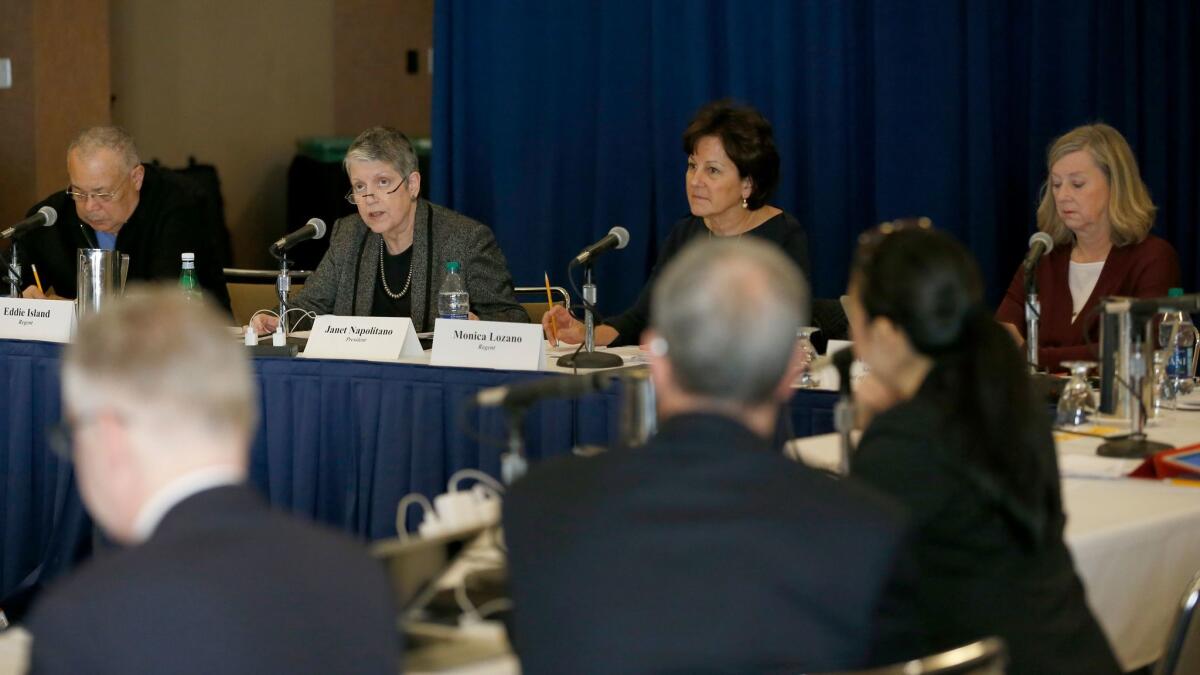The hot-button issues on the UC regents’ agenda: Rising costs, nonresident enrollment and campus housing shortages

- Share via
University of California regents will tackle a host of hot-button issues at their two-day meeting in San Francisco beginning Wednesday, including proposed enrollment limits on students from other states and countries, the rising cost of attendance and the campus housing squeeze.
Regents also will vote to approve the appointment of Carol T. Christ, UC Berkeley’s top academic officer who would be the 11th chancellor and first woman to lead the 149-year-old campus.
Board members also will discuss a proposed policy to impose sanctions against regents found to have violated university rules on ethics and sexual misconduct, even outside their university roles. The proposal was triggered by disclosures that Regent Norman Pattiz had made sexually inappropriate remarks to employees and independent contractors at his Podcast One studio in Beverly Hills. He apologized and underwent sexual harassment prevention training.
A lively debate is expected over UC’s proposal to cap undergraduate enrollment at 20% of the student population systemwide. Nonresident students numbered 34,673 at the system’s nine undergraduate campuses in fall 2016, or 16.5% of the system’s 210,170 undergraduates. That proportion has quadrupled since 2007, as campuses scrambled to make up major state budget cuts with the extra tuition dollars that students from other states and countries pay.
UC also has increased the number of California students by 10% over that time. But the growing reliance on nonresident enrollment has sparked a backlash from California families and legislators. Lawmakers are requiring that UC adopt a policy limiting out-of-state students in order to receive $18.5 million in additional state funding.
The proposed policy, aimed at balancing the needs of California students with the benefits of diversity and the additional money that nonresidents bring in, has drawn mixed responses. The UC Academic Senate opposes what it calls “arbitrary quotas,” while some lawmakers wanted UC to cap nonresidents at their current proportion of 16.5% rather than allow for growth.
In other business, regents will discuss a new survey that found that the cost of attending UC rose an average of 4% this year compared with last year Housing and food costs increased, while expenses for transportation and books declined.
The financial squeeze on students from rising college costs and loan debt has become a hot issue in Sacramento. Assembly Democrats this week proposed what would be the most generous college financial aid plan in the nation, covering not only tuition and fees but also living expenses.
UC officials also will present plans to expand campus housing at UC Berkeley and UCLA, which are located in two of the state’s tightest and most expensive real estate markets. Berkeley has the lowest proportion of available beds of any UC campus, accommodating only 22% of undergraduates and 9% of graduates each year. The campus is able to guarantee students just one year of campus housing, compared to three years at UCLA.
The two-day meeting in San Francisco will be livestreamed, beginning Wednesday at 9 a.m.
To read the article in Spanish, click here
ALSO
UC President Janet Napolitano reiterates vow to protect immigrant students
UC regents asked to lift a six-year tuition freeze and approve a 2.5% increase for this fall
UC proposes its first enrollment cap — 20% — on out-of-state students
More to Read
Sign up for Essential California
The most important California stories and recommendations in your inbox every morning.
You may occasionally receive promotional content from the Los Angeles Times.











